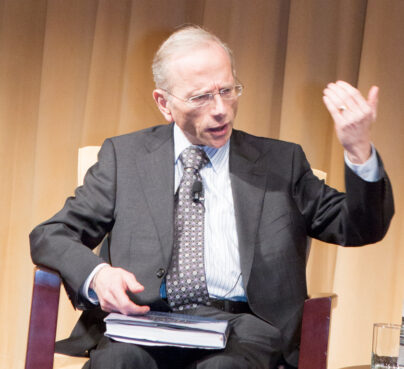“Don’t know much about history…” Those were the immortal words of Sam Cooke.
It happens to be true. Many of us don’t know much about history. Just think of the way that we use the word. Someone gets fired from a job, and what do we say? “She’s history.”
But, I love history, especially American Jewish history. No one has nourished that love of history more than Professor Jonathan Sarna of Brandeis University, past president of the Association for Jewish Studies and Chief Historian of the National Museum of American Jewish History in Philadelphia.

Lincoln and the Jews; Jonathan D. Sarna, Chief Historian of the National Museum of American Jewish History, discusses his new book Lincoln and the Jews
Let me tell you why I sought out Professor Sarna for this conversation and podcast.
It is the question that has been keeping me awake at night, ever since October 7 — and even more than that, in its aftermath.
Many Jewish communities in the Diaspora have long histories — in some cases, for more than a thousand years. But, their periods of peaceful co-existence and integration usually last about two hundred years, and not much longer.
Then, those periods of peace begin to crumble.
As I consider the rise of antisemitism in this country, I asked myself and Professor Sarna: Are we entering a new, and unsettling period of American Jewish history? Have we, like the German Jews of the 1920s and 1930s, been too complacent, comfortable, and even arrogant — to think that we, of all historic Jewish communities, would escape the cycles of history?
Bret Stephens put it this way in the New York Times:
There’s a historical pattern. In the early 1920s, the most important scientist in Germany was Albert Einstein, the most important politician was Walther Rathenau and the most important philosopher was Edmund Husserl. All Jews. They wound up exiled, murdered or shunned. Today, the U.S. secretaries of state, Treasury and homeland security are Jewish, as is the majority leader in the Senate and the president’s chief of staff. Too often in Jewish history, our zenith turns out to be our precipice…
My own musing on this subject, which Professor Sarna and I discuss:
Did we fail to understand and internalize the story of the complacency of German Jews, and the affluent, acculturated Jews of central Europe? Those clueless Jews populated the novels of the late Israeli author, Aharon Appelfeld. His characters believed themselves to be too rich, too comfortable, too cultured, to confront the coming horror. They simply could not get their minds around what is happening, oblivious to what lay before them, lethally naïve.
So, now, we gulp. Were we, as well, Appelfeld’s characters? Have we been naïve? Did we think that if we only put enough blood on our well-appointed, designer door posts, the twin angels, the Angel of Death and the Angel of History, would simply pass us by? Was the American Jewish dream simply that – a dream?
In this podcast, Professor Sarna and I get into the weeds of American Jewish history, and the history of anti-Semitism, American style. Pay attention:
- Both Brandeis University and the state of Israel are celebrating their 75th anniversary. One event happened in Waltham, Massachusetts; the other, in the Middle East. How are those two events linked?
- Americans have had “diverse and conflicting attitudes“ toward Jews. Name some Americans who were simultaneously antisemitic and philo-semitic (lover of Jews).
- Why were my parents upset when I purchased a 1966 Mustang? (Hint: consider the maker).
- Who was America’s most famous and visible Jew-hater? (Answer: In the 1930s, Father James Coughlin, an antisemitic priest, had a huge radio following. Imagine Father Coughlin with TikTok).
- Compared to other American minorities, historically Jews have gotten off pretty easy. Name some other groups in America that have suffered bigotry — even more than the Jews. (Hint: and not just Blacks).
- Is anti-Zionism a form of anti-Semitism? (Hint: the Hamas killers bragged to their parents that they killed — not Israelis, not Zionists, but Jews.) (A second hint: What was the name of the most infamous Czarist anti-Semitic tract, that is still a best seller in too many places? It is a mythology of global Jewish control, and its name is “The Protocols of the Meetings of the Learned Elders of ___________.”)
- What would happen if college admissions corresponded to the percentage of Jews in America? (Hint: It would not be good for the Jews.)
- As bad as it might seem today, what makes this situation “better” than other surges of anti-Semitism that we have experienced in the past? (Hint: watch how the government is responding).
Finally, you must listen to the very end — because Professor Sarna offers words of hope, determination, and inspiration that will lift your souls.
How does he do it? Because he is, after all, a historian.
His attitude is not the world-weary “Been there, done that.”
It is, rather, “been there, done that, had that done to us, endured that, survived that, grew from that.”
That is precisely what we need at this delicate time in our history.
It was an honor to have such an esteemed guest on the podcast. Please give it a listen; you will emerge with more than a semester’s worth of American Jewish history.
Not only that; you will never again think that history is, well, history.
Please enjoy my new book — the first book to outline what a post-October 7 American Judaism will look like — and how we can restore communal obligation to liberal Jewish life. Tikkun Ha’Am/ Repairing Our People: Israel and the Crisis of Liberal Judaism.





